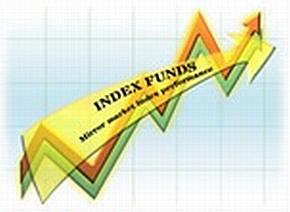
While India's business world is made up of thousands of entities like corporations, companies, partnership and sole proprietorship firms, cooperative societies and the one man outfits, only a few hundred are actually listed on the various stock exchanges of the country and of these only 50 large companies actually form the two major market indices, the Sensex (30) and the Nifty (50).
These indices are important indicators of India's economic and financial health. When these indices are soaring consistently, the economy is doing great and when, languishing in the red, these indices announce the dismal state of affairs in the country.
So when you believe in the success of an economy one of the most efficient ways of turning this belief into gains for you is investing in the index of this economy. Very simply, if the economy is going to do well, the stock market index will rise and hence you gain.
An index fund is exactly that. It is a fund that attempts to mirror a stock market index or a sectoral index as closely as possible by investing in the stocks that form that index in the very same proportion. So a nifty index fund would have the same 50 companies that make up Nifty in the same weightage.
www.investmentyogi.com is a one-stop personal finance website which helps in managing finances, investments and taxes through services like financial planning, online tax filing, budgeting and 'Ask the Expert'.

The aim of an index fund is to replicate the performance of that market index. So if the markets are rising, then your investment will rise with almost the same percentage and if it is falling, you will get similar negative returns. Of course, investing in a stock index fund guarantees that you'll never outperform the overall market
The main advantage of investing in an index fund is the low Expense Ratio that is incurred in these funds as compared to other investments. Expense ratio is the annual fund management charge that is charged on a daily or weekly basis and varies between 1.7 to 2.3 per cent per annum for actively managed funds. However, for Index Funds this expense ratio is usually as low as 1-1.5 per cent as there is little for a fund manager to do here other than replicate the index.
There is no need for research, analysis or scouting for good bargains and hence the reduced expenses for the fund. Further there is little portfolio turnover resulting in lower trading costs. All this cost savings can be significant, especially for long-term investors.
There is absolute transparency as far as the holdings of the fund are concerned since the investor knows which stocks are being held and in what proportion. Another important advantage is the benefit of diversification through investing in different companies from different sectors of the economy which largely diffuses risk.
On the whole in strong bull markets, index funds investing or indexing as it is also called, as a strategy makes a lot of sense.
www.investmentyogi.com is a one-stop personal finance website which helps in managing finances, investments and taxes through services like financial planning, online tax filing, budgeting and 'Ask the Expert'.

One can follow an indexing strategy either through investment in index mutual funds or index exchange traded funds (ETFs). The ETFs are collection or basket of stocks, that are bought and sold like individual stocks on the stock exchange.
An index ETF would be a group of all the stocks that make up the index and in the same proportion. An ETF offers few additional advantages besides the above such as far greater trading flexibility since they are priced throughout the day and can be traded at any point unlike the index mutual funs which has only one value NAV, during a single day. Further, ETFs are traded on the exchange and hence the opportunities for option and short-selling exist.
Whichever route one follows for index funds, there is a flip side to this. In growing markets like India, while index funds will give good returns, actively managed funds are likely to give better returns. Let's understand this using Sensex as an example. When the economy on the whole is doing well, all the 30 stocks in the sensex will also grow but in different proportions.
While an index fund can capitalise only on the general growth, an actively managed mutual fund will invest in larger proportions in those companies of these 30 which have a higher potential for growth and thereby increase the returns and therefore beat the market returns or index returns.
As seen over past several sharp bull markets in India and other economies, one can conclude that during sharp rises and strong bull markets, a well managed, consistent and diversified fund can beat index funds by a huge margin. However as markets mature and go through a stabilising period or a falling period; diversification, lower cost and maintenance give index funds an edge over individual stock picking.
www.investmentyogi.com is a one-stop personal finance website which helps in managing finances, investments and taxes through services like financial planning, online tax filing, budgeting and 'Ask the Expert'.